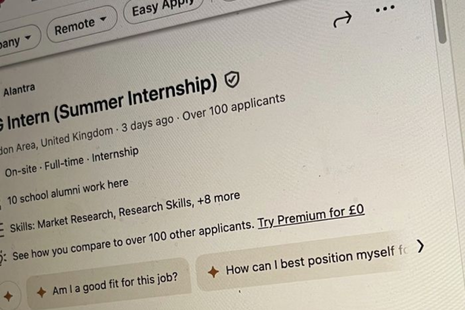Inside the corporate summer internship – humanities edition
Every summer, cohorts of penultimate year students look forward to two months of air-conditioned offices and Excel spreadsheets in a corporate internship

A professional services career strikes the perfect balance between a relative lack of ‘hard’ skills as a humanities student and unwillingness to sell your soul to Big Law, along with a decent paycheck in London or Manchester, cities that seem like the centre of the world for a UK uni graduate. Whilst the ethics of hiring a 22-year-old history grad to consult a multinational corporation to ‘make more revenue, cut losses’ is questionable, there is certainly no shortage of such students willing to take on that role.
But gone are the days when a 2:1 humanities degree from Cambridge could guarantee you a swanky consultancy job. Students hoping for a lifestyle of eight pounds Pret salads and open-plan offices will have to undergo a psychologically gruelling recruitment process, taking hours out of their weeks during term time. And that’s just for a two month summer internship.
Some might question the utility of a summer internship at all. Outside of the LinkedIn hustle-sphere, most students don’t bother with them at all and still end up fine. However, many students simply can’t afford to leave it to chance. Alongside career-driven CV-stackers, those who can’t afford to do a panic masters or take a year out to travel and ‘figure things out’ can be pushed to ideological compromises, desperately trying to find any work experience that will take you.
“As the economy shrinks, less vacancies but more young grads makes the competition for professional services roles more toxic than ever”
I spoke to some Cambridge students who recently completed summer internships at the end of their second-year, all who will remain anonymous to protect privacy (and job prospects!). The internship journey starts from the dreaded application.
Out of those I spoke to, the number applications for the summer 2024 internship cycle per student ranged from three to 50. The amount of companies responding with interview invitations ranged from zero to six. It was more intensive than applying to university, which typically requires one personal statement and one interview, and only one subject.
Psychometric personality tests; maths tests; three plus rounds of interviews; day long assessment centres held in London on a supo day: these are key components of trying to find a job as a student or graduate. As the economy shrinks, less vacancies but more young grads makes the competition for professional services roles more toxic than ever.
“One intern highlighted the ‘social pressure at Cambridge to secure an internship’”
According to TargetJobs, the Insitute of Student Employers found that in 2023, “graduate applications per vacancy increased through 2023, up by 38%, with an average of 86 applications per vacancy”. For student internships, these stats seem to be even more extreme - when sifting through 15+ pages of LinkedIn results for ‘consulting/communications internship summer 2024’, it is rare to see a posting over a day-old that didn’t already say ‘100+ applications’ next to it. It should be taken into account, however, that the inflated figure designates how many people clicked on the button rather than submitted a complete application.
LinkedIn is increasingly relied on to find internships. Whilst making these jobs more accessible for students without a clear idea of the industry they want to go into, it does increase competition. LinkedIn widens the pool of talent for companies and allows hoardes of students to spam-click the ‘Easy Apply’ button: the job-hunting equivalent of throwing shit to the wall and seeing what sticks.
However, students can hardly be faulted for this. Rarely do second-year students, at whom these internships are marketed, have a clear-enough idea of what industry they want to go into, let alone what specific company. One intern highlighted the “social pressure at Cambridge to secure an internship.”
The main appeal for them was the increased peace of mind by gaining work experience for your CV in an “overly competitive” environment in the City of London. Their internship was more geared towards “fill[ing] in” the gaps of employees going on summer holidays, and less dedicated to giving the students a “holistic” experience.
“By the time I get home I’m too tired to really do anything else”
There is a lot of work, and in some ways that kind of environment is something that Cambridge prepares you for. At an agency or consultancy, same-day deadlines are the norm, and often a superior can be dependent on your research briefing for a client meeting in just a few hours. At other times, people found that they were twiddling their thumbs, and little explanation can be given for the tasks that you do have: “asking for more work isn’t always the best idea as I then got set a task I was completely clueless about.”
Ultimately, people felt that they learnt a lot and overall sentiment was positive. One told me that “within the team it felt like people were genuinely interested in my perspective.” The experiences gained were varied and transferable, and interns were “involved in lots of different areas within the project.” Another praised the lively culture of the office, being “beneficial for new and young employees. The structure is flat, the business is highly competitive and everyone is willing to learn.”
“It can sometimes feel like you’re penalised for not spending more time at work than you’re contracted to.”
However, one major concern that stuck out to many when entering the world of work is the lack of time to yourself. One mentioned that “by the time I get home I’m too tired to really do anything else.” When quizzing colleagues about this, the consensus was that “during the week it’s almost impossible.”
There is certainly a big emphasis on ‘office culture’ and after-work drinks: “We have found the time for post-work tapas and the office environment is a lot less stuffy than I’d anticipated.” Whilst it’s definitely a nice way to get to know your colleagues outside of team projects, it can sometimes feel like you’re penalised for not spending more time at work than you’re contracted to. Indeed, another mentioned that “Many internships contract students for a nine to five yet exist within 12-hour (if not longer) working day cultures in which interns feel obligated to ‘prove themselves’ by working much more than they are paid for.”
It’s clear that interns do gain more than some LinkedIn connections and an advanced working knowledge of Microsoft Suite from these internships. They are invaluable work experience and a stepping stone to that sweet, sweet grad job. The professional services industry is a fast-paced environment, stereotypically filled with overachievers and a ‘work hard, play hard’ culture – not dissimilar to Cambridge at all.
 News / Uni Scout and Guide Club affirms trans inclusion 12 December 2025
News / Uni Scout and Guide Club affirms trans inclusion 12 December 2025 News / Cambridge Vet School gets lifeline year to stay accredited28 November 2025
News / Cambridge Vet School gets lifeline year to stay accredited28 November 2025 Science / Did your ex trip on King’s Parade? The science behind the ‘ick’12 December 2025
Science / Did your ex trip on King’s Parade? The science behind the ‘ick’12 December 2025 News / Cambridge study finds students learn better with notes than AI13 December 2025
News / Cambridge study finds students learn better with notes than AI13 December 2025 News / Pembroke to convert listed office building into accom9 December 2025
News / Pembroke to convert listed office building into accom9 December 2025








